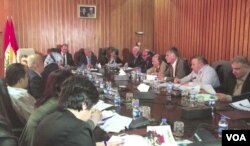Christian and Turkmen minority lawmakers threw their voices behind a proposal put to Kurdistan's Constitutional Committee Monday that would set up political councils to enshrine the rights of ethnic and religious minorities and ensure their participation in the Iraqi region’s governance.
Christians are often treated as second class citizens by the Kurdish majority, explained Srood Maqdasy, a Christian Member of Parliament.
“We can call it a feeling of superiority, we have religious problem, we have problem with regard to land occupation and properties, a lot of problems. So this council will follow these issues,” Maqdasy told VOA.
“The problem with the minorities in the Kurdistan region is that we have legislation, we have laws that have been passed – but we have problems with implementation,” Maqdasy said.
Two council plan
Proposed by Kurdistan’s Middle East Research Institute, there would be two councils: one to represent the region’s ethnic minorities, such as Turkmen, Arabs, Assyrians and Chaldeans, and another to represent religious minorities, such as Yazidis, Christians, Zorastrians and Baha’is.
Although Kurdistan forces have fought and defended the lives of minorities flooding into the autonomous northern Iraqi region to escape Islamic State extremists and sectarian violence, many minorities say they do not have any effective political voice.
Arabs in particular will say privately that they are discriminated against.
“They hate us,” one young Sunni Arab male told VOA, asking that his name not be used for fear of retaliation.
Underrepresentation
Currently there are only 11 seats out of the 111-seat regional parliament reserved for Christians and Turkmen. Dlawer Ala’Aldeen, president of Kurdistan’s Middle East Research Institute said there was no proper representation for Arabs, Yazidis and other minorities.
“This is a time to fill these gaps with legislation and enshrine it in the constitution,” Ala’Aldeen told VOA.
Ala’Aldeen said although minority rights are mentioned in the constitution, they are not effectively implemented. The proposal his Institute put before the 21-member Constitutional Committee Monday aimed to correct those flaws.
“These are complex matters. Unless they are ensured with sophisticated and integral mechanisms, it’s easy for the majority rule to overwhelm minorities, and we’ve seen good examples of that in Iraq, in the entire Middle East,” said Ala’Aldeen.
Kurdistan is an autonomous region in northern Iraq, based on a geographic area populated largely by ethnic Kurds. In the past year, as Kurdish forces fought back the Islamic State, they also gained control of disputed areas in Sinjar, Ninewah and Kirkuk, where Yazidis, Christians and Turkmen live.
The Committee said they would take the proposal under review and come up with language to include into the region’s constitution.








